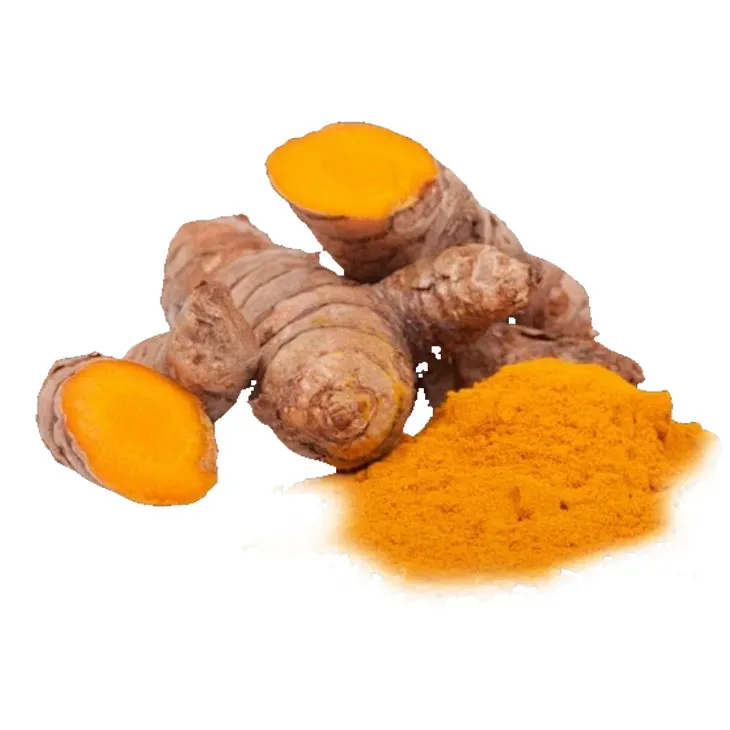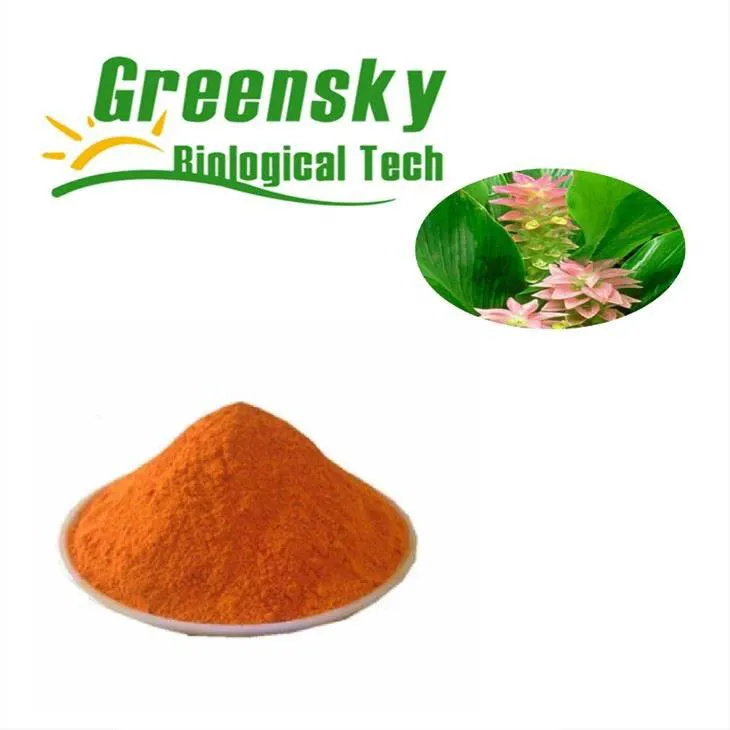- 0086-571-85302990
- sales@greenskybio.com
What is curcumin and why use it on the skin?
2024-11-12

1. Introduction to Curcumin
Curcumin is a natural compound that is derived from the turmeric root. Turmeric, known botanically as Curcuma longa, has been used for centuries in traditional medicine, particularly in Ayurvedic and Chinese medicine systems. Curcumin is the main bioactive component of turmeric, responsible for many of its health - promoting properties.
Chemically, curcumin is a polyphenol. It has a distinct yellow color, which is why turmeric - containing products, including those with curcumin, often have a characteristic yellow hue. This compound has a complex molecular structure that endows it with a wide range of biological activities.

2. Antioxidant Properties of Curcumin for the Skin
One of the most significant reasons for using curcumin on the skin is its powerful antioxidant activity.
2.1 Free Radicals and Skin Aging
Our skin is constantly exposed to environmental stressors such as ultraviolet (UV) radiation from the sun, pollution, and cigarette smoke. These factors generate free radicals, which are highly reactive molecules that can cause damage to the skin cells. Free radicals can oxidize important cellular components like lipids, proteins, and DNA. Over time, this oxidative damage accumulates and leads to premature skin aging, manifested as wrinkles, fine lines, and a loss of skin elasticity.
2.2 How Curcumin Fights Free Radicals
Curcumin acts as a scavenger of free radicals. It has the ability to neutralize these harmful molecules before they can cause significant damage to the skin. By donating electrons to free radicals, curcumin stabilizes them and prevents them from oxidizing other cellular components. This antioxidant action helps to maintain the integrity of the skin cells and protect the skin from the premature aging effects of environmental factors.
Studies have shown that curcumin can increase the activity of antioxidant enzymes in the skin. These enzymes, such as superoxide dismutase (SOD) and catalase, play a crucial role in the body's natural defense against free radicals. By enhancing the activity of these enzymes, curcumin further boosts the skin's antioxidant defense system.

3. Anti - Inflammatory Effects of Curcumin on the Skin
Inflammation is a common underlying factor in many skin disorders. Curcumin's anti - inflammatory properties make it a valuable ingredient for skin health.
3.1 Skin Inflammatory Disorders
Conditions such as acne, eczema, psoriasis, and dermatitis are all characterized by inflammation in the skin. In acne, for example, inflammation occurs due to the blockage of hair follicles, which leads to the growth of bacteria and an immune response. In eczema and psoriasis, the immune system becomes overactive, causing inflammation and abnormal skin cell proliferation.
3.2 Mechanisms of Curcumin's Anti - Inflammatory Action
Curcumin works by modulating the body's inflammatory pathways. It can inhibit the production of pro - inflammatory cytokines, which are signaling molecules that promote inflammation. For example, curcumin has been shown to reduce the levels of interleukin - 1 (IL - 1), interleukin - 6 (IL - 6), and tumor necrosis factor - alpha (TNF - α), all of which are key players in the inflammatory process.
Furthermore, curcumin can also regulate the activity of immune cells in the skin. It can suppress the activation of macrophages and neutrophils, which are immune cells that release inflammatory mediators. By reducing the activity of these cells, curcumin helps to calm the inflammatory response in the skin.

4. Curcumin and Skin Texture Improvement
Curcumin can also have a positive impact on skin texture, making it smoother and more youthful - looking.
4.1 Cell Turnover and Regeneration
The outermost layer of the skin, the epidermis, is constantly renewing itself through a process called cell turnover. In a healthy skin, old, dead skin cells are shed regularly, and new cells are generated from the basal layer of the epidermis. However, as we age or due to certain skin conditions, this process can slow down.
Curcumin has been shown to influence cell turnover and regeneration in the skin. It can stimulate the proliferation of keratinocytes, which are the main cells in the epidermis responsible for producing the skin's protective barrier. By promoting the growth of keratinocytes, curcumin helps to speed up the renewal of the epidermis, resulting in a fresher and more radiant complexion.
4.2 Collagen Production
Collagen is a crucial protein in the skin that provides structural support and elasticity. As we age, collagen production decreases, leading to sagging skin and wrinkles.
Some studies suggest that curcumin may have a role in promoting collagen production. It can stimulate fibroblasts, the cells in the dermis that are responsible for synthesizing collagen. By increasing collagen production, curcumin helps to improve the firmness and elasticity of the skin, thereby enhancing the overall skin texture.

5. Using Curcumin in Topical Skin Products
Given its numerous benefits for skin health, curcumin has become a sought - after component in topical skin products.
5.1 Formulations
Curcumin can be found in a variety of topical formulations, including creams, lotions, serums, and masks.
- Creams: These are often thicker in consistency and are suitable for providing long - lasting hydration and protection to the skin. Curcumin - containing creams may be beneficial for dry or mature skin types.
- Lotions: Lotions are lighter than creams and are more easily absorbed by the skin. They are a good option for those with normal to oily skin. Curcumin - infused lotions can provide antioxidant and anti - inflammatory benefits without leaving a greasy residue.
- Serums: Serums are highly concentrated formulations that contain a high dose of active ingredients, including curcumin. They are designed to penetrate deeply into the skin and target specific skin concerns, such as fine lines and wrinkles or uneven skin tone.
- Masks: Face masks are used for a more intensive treatment. Curcumin - based masks can be left on the skin for a short period of time to deliver a concentrated dose of curcumin and other beneficial ingredients, leaving the skin refreshed and rejuvenated.
5.2 Considerations for Using Curcumin - Containing Products
When using curcumin - containing topical products, there are a few things to keep in mind.
- Sensitivity: Some individuals may be sensitive to curcumin or other ingredients in the product. It is advisable to do a patch test on a small area of skin before applying the product to the entire face or body. If any redness, itching, or irritation occurs, discontinue use.
- Staining: Due to its yellow color, curcumin may cause some staining on the skin or clothing. To avoid this, make sure to follow the product instructions carefully and wash your hands thoroughly after application.
- Effectiveness: While curcumin has shown great potential in improving skin health, the effectiveness of a product may vary depending on the concentration of curcumin, the quality of the formulation, and individual skin characteristics. It may take some time to see visible results, so consistency in use is key.

6. Conclusion
Curcumin, a natural compound derived from turmeric root, offers a wide range of benefits for skin health. Its antioxidant properties help to prevent premature skin aging by fighting free radicals, its anti - inflammatory action can calm various skin disorders, and it can improve skin texture through influencing cell turnover and collagen production. With its increasing popularity in topical skin products, curcumin has the potential to be a valuable addition to our skin care regimens. However, as with any skin care ingredient, it is important to use curcumin - containing products carefully and be aware of any potential sensitivities or side effects.
FAQ:
Q1: What is curcumin?
Curcumin is a substance sourced from turmeric root. It has several beneficial properties, such as being highly antioxidant and having anti - inflammatory actions.
Q2: How does curcumin prevent premature skin aging?
Curcumin is highly antioxidant. It helps prevent premature skin aging by combating the environmental factors that can damage the skin and lead to aging.
Q3: In what skin disorders can curcumin be useful?
Since curcumin has anti - inflammatory action, it can be useful in various skin disorders where inflammation is a factor.
Q4: How does curcumin improve skin texture?
Curcumin may influence cell turnover and regeneration, which in turn can improve skin texture.
Q5: Why is curcumin a sought - after component in topical skin products?
It is a sought - after component in topical skin products because of its antioxidant, anti - inflammatory properties and its ability to improve skin texture.
Related literature
- The Role of Curcumin in Skin Health: A Review"
- "Curcumin and Skin Diseases: From Traditional Medicine to Modern Research"
- "Beneficial Effects of Curcumin on Skin Aging: Molecular Mechanisms"
- ▶ Hesperidin
- ▶ Citrus Bioflavonoids
- ▶ Plant Extract
- ▶ lycopene
- ▶ Diosmin
- ▶ Grape seed extract
- ▶ Sea buckthorn Juice Powder
- ▶ Fruit Juice Powder
- ▶ Hops Extract
- ▶ Artichoke Extract
- ▶ Mushroom extract
- ▶ Astaxanthin
- ▶ Green Tea Extract
- ▶ Curcumin
- ▶ Horse Chestnut Extract
- ▶ Other Product
- ▶ Boswellia Serrata Extract
- ▶ Resveratrol
- ▶ Marigold Extract
- ▶ Grape Leaf Extract
- ▶ New Product
- ▶ Aminolevulinic acid
- ▶ Cranberry Extract
- ▶ Red Yeast Rice
- ▶ Red Wine Extract
-
Baicalin
2024-11-12
-
Eucommia Ulmoides Extract
2024-11-12
-
Almond Extract Powder
2024-11-12
-
Dandelion Leaf Extract
2024-11-12
-
Mango flavored powder
2024-11-12
-
Diosmin
2024-11-12
-
Green coffee bean Extract
2024-11-12
-
Gynostemma pentaphyllum extract
2024-11-12
-
Lemon Juice Powder
2024-11-12
-
Pomegranate Extract
2024-11-12





















